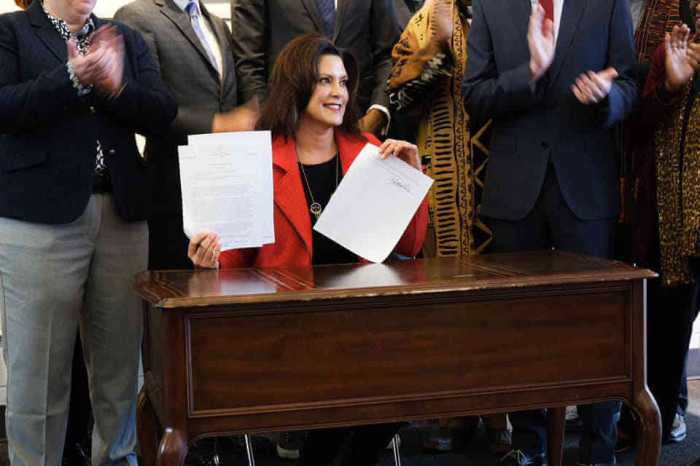Legal observers widely expect the Supreme Court to rule next month that same-sex couples have a right to marry under the 14th Amendment of the US Constitution, but such a ruling will not necessarily settle all the issues of parental rights of same-sex couples that continue to divide the courts. Litigation in four jurisdictions demonstrates the continuing problem of sorting out the issues.
The Massachusetts Supreme Judicial Court, on May 7, ruled that the traditional presumption that a child born to a married woman is the legal child of her spouse applies to a lesbian couple. As a result, they need not provide formal notice to their sperm donor that they are seeking a joint adoption in order to avoid problems if they travel or relocate outside Massachusetts.
But on May 20, the New York Second Department Appellate Division, in Brooklyn, ruled that the parental presumption does not apply to a lesbian couple, affirming a Nassau County family court ruling that the non-biological mother has no standing to seek a joint custody order for the child born to her same-sex spouse.
Disputes in four states highlight disparities Supreme Court ruling may only begin to resolve
In Oregon, the Court of Appeals ruled on May 13 that the question of whether the former registered domestic partner of a birth mother should be considered the legal parent of the child turned on whether the women would have married had that option been available when the child was born.
And, in Wisconsin on the same day, Lambda Legal filed suit on behalf of a married lesbian couple denied the benefit of the marital presumption by state officials who have thus far refused to list both women as parents on their child’s birth certificate.
The cases each present somewhat different facts, but all of them implicate the question whether the birth of a children to a lesbian couple through donor insemination creates the legal presumption that both women are parents. The concept of parental presumption differs in its strength from state to state, but has generally been applied by courts and government officials to ensure that a child born to a married woman not be deemed “illegitimate” and be entitled to the support of the biological mother’s spouse. That presumption took on particular significance when married different-sex couples began to employ donor insemination to address male infertility, raising questions about the legal rights and responsibilities of the husbands.
In the Massachusetts case, petitioners J.S. and V.K., a married lesbian couple, filed a joint petition to adopt their son Nicholas born to J.S. in 2014, having been conceived through in vitro fertilization using a known sperm donor. The women were married when Nicholas was born, and both are listed as parents on his birth certificate. According to Justice Fernande R.V. Duffly’s opinion for the Supreme Judicial Court, the women “sought to adopt their son as a means of ensuring recognition of their parentage when they travel outside the Commonwealth or in the event of their relocation to a State where same-sex marriage is not recognized.” Because the sperm donor is not a legal parent of Nicholas, they sought to proceed with the adoption without giving him notice. A family court judge denied the motion, finding the question needed resolution by an appellate court.
Justice Duffly made clear that parental presumption controlled the issue’s resolution.
“As is consistent with our paternity statutes and long-standing presumption of the legitimacy of marital children, [the statute] confers legal parentage only upon the mother’s consenting spouse, not the sperm donor,” she wrote, reversing the family court’s motion denying the two mothers’ motion.
The contrary ruling from the New York Appellate Division provides little rational explanation. As Gay City News reported last summer, the case of Jann P. v. Jamie P. produced a startling June 30 ruling from Nassau County Family Court Judge Edmund M. Dane holding that the state’s 2011 Marriage Equality Law, which provides that same-sex and different-sex marriages should be treated the same for all purposes of New York law, did not apply to the parental presumption. Identifying the parties as Jann and Jamie Paczkowski, who were previously anonymous in this proceeding, the appeals court noted that while the couple was married at the time of their child’s birth, their marriage was apparently shaky and no adoption was undertaken.
When the couple separated, Jann sought a court order allowing her continued contact with her son, but Judge Dane insisted the parental presumption did not apply because it was physically impossible for Jann to have been the child’s biological parent. On May 20, the Appellate Division echoed this conclusion.
“Here, the petitioner, who is neither an adoptive parent nor a biological parent of the subject child, failed to allege the existence of extraordinary circumstances that would establish her standing to seek custody,” wrote the court. The statutory provisions concerning the parental presumption, the opinion continued, “do not provide her with standing as a parent, since the presumption of legitimacy they create is one of a biological relationship, not of a legal status, and, as the nongestational spouse in a same-sex marriage, there is no possibility that she is the child’s biological parent.”
The court’s wording signals the archaic legal formalism of its approach. The opinion’s reference to “the subject child” as if this case did not involve flesh-and-blood people with emotional and psychological attachments — the bonding of a mother-child relationship extending over many months until Jann’s continued contact with her child was cut off — suggests the judges were more concerned with legal categories than human relationships. That priority is totally at odds with the underlying philosophy of family law, which strives to protect the best interest of children in disputes involving their parents.
The case cries out for reversal by the Court of Appeals or the State Legislature. Surely, when the Legislature adopted the Marriage Equality Law that expressly provides that same-sex and different-sex marriages were to be treated as equal in all legal respects, it could not have implicitly intended to create an exception to the parental presumption statute. It is particularly significant that the statute is not written in gendered terms, its clear intent aimed at legitimizing the birth of any child born to a married woman by recognizing both spouses as parents. The practice commentary published in the statute book specifically states that this presumption “should apply to same sex as well as heterosexual married couples,” citing a 2014 ruling from upstate Monroe County to that effect.
The Oregon case is a bit more complicated. Karah and Lorrena Madrone, same-sex partners, celebrated a commitment ceremony several years before Lorrena bore a child through donor insemination, but they did not have a legally recognized relationship. After the child was born, they entered into a registered domestic partnership, though there is evidence the two women’s relationship began to deteriorate during Lorrena’s pregnancy, and the two women disagree about the circumstances under which they signed their domestic partnership papers. They did, however, adopt the surname Madrone, which was used for the child’s birth certificate listing both of them as parents.
The court of appeals determined that Karah’s parental standing should turn on whether the women would have married had that option been available to them at the time the child was born. Thus, the court implicitly endorsed the view that if this same-sex couple had been married when the child was born, Karah’s parental status would have been the same as that of a husband whose wife became pregnant through donor insemination. The hurdle Karah likely faces is evidence that Lorrena had expressed ideological opposition to marriage as an institution, as well as her testimony that having the child was originally her idea and she never intended for Karah to be the child’s legal parent.
The Lambda Legal lawsuit in Wisconsin seeks to vindicate the parental presumption principle there, where marriage equality — including the state’s obligation to recognize same-sex marriages from other states — has been a reality since last fall.
Chelsea and Jessamy Torres have lived as partners in a committed relationship since 2010, and were married in 2012 in New York. They live in Madison and began trying to have a child in 2013, when Chelsea began working with a fertility clinic. Their child was born this March, but when they filed forms to obtain a birth certificate listing both of them as parents, the state’s Department of Health Services sent them notification that listed Chelsea as the only parent. Though the state has said it is “evaluating” the situation, Chelsea and Jessamy had not received relief by the time they turned to the US District Court on May 13.
Their complaint notes that Wisconsin law embodies the parental presumption and applies in cases where mothers become pregnant through assisted reproductive technology. The law uses the gendered terms husband and wife, but courts in other states, including California, have concluded such statutes should be construed as gender-neutral in cases involving same-sex married couples. The women allege that failure to apply the parental presumption and issue the birth certificate they seek violates the couple’s equal protection and due process rights under the 14th Amendment.
It may be that once the US Supreme Court has issued a marriage equality ruling these parental presumption issues will begin to be sorted out in a consistent manner, but the differing approaches of state officials and courts suggest that this is one issue that will require further work. The practical implications of marriage equality may take some time to reach full fruition.

































